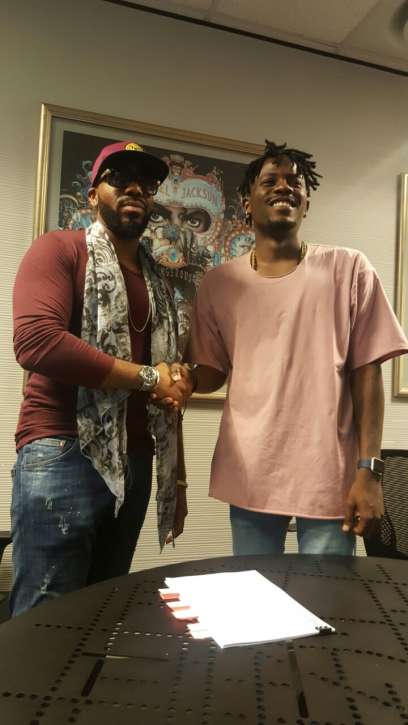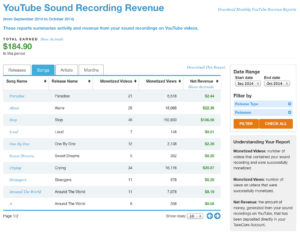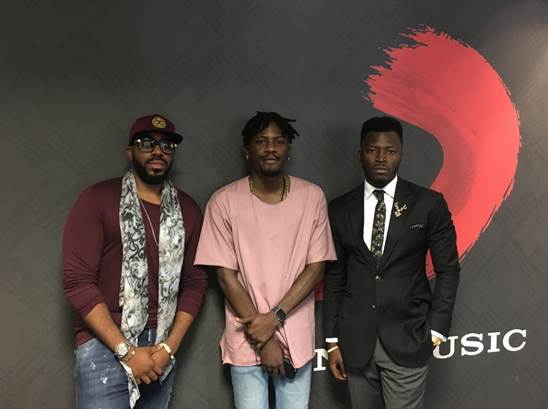We almost made it, people! We almost made it through 2017 without a record label and one of its star acts falling out in public, if you ignore Kcee vs Harrysong’s issues spilling over from 2016, that is.
Last year was particularly hot, Zeez was sued an arm and a leg for breach of contract, Skales fell out of love and then back in love with Baseline Records and, after alleging that his label boss threatened to kill him, Runtown shocked the world and completed the same exact U-turn.
However those were domestic incidents, things have now gone international, bigly. Early in the week, Ycee shocked us all when he launched an extraordinary attack against his boss at Sony Music West Africa, Michael Ugwu, accusing him of duping artists and not doing things in their best interest. Whether Michael is heading a small, local division of Sony or not, an artist calling out an exec of the major label they are signed to is a big deal. Michael responded with tweets of his own, summarily saying you don’t get what you deserve, you get what you negotiate:
The act of making false statements about another which harms his reputation. Defamatory statements broadcast over media = libel #defamation. A contract is a “voluntary” arrangement between two or more parties that is enforceable by law as a binding legal agreement #issacontract. Appropriate methods of contract dispute resolution. 1)Negotiation 2)Mediation 3)Arbitration 4)Litigation #appropriate.
However, just so you know he wasn’t ‘hacked’ or gone off that bubbly, Ycee doubled down on his initial claims the next day. He blamed Michael for the delay in his debut project and chastised him for taking advantage of the naïveté of artists he feels it’s his role to protect.
It’s obvious something hasn’t clicked yet with Ycee and Sony. Despite delivering one of the biggest songs of 2017 in “Juice”, the label hasn’t exactly taken Ycee to the next level just yet. In a post-alkyada, banku music world, there are two sounds that have dominated Nigerian pop radio in 2017 – the drowsy wavy sound and the similarly laid back pon pon music. Ycee has been at the forefront of the wavy sound for a while, and by now, he ought to look less like a rider of the wave and more like the provider of the wave. Ycee signed to Sony in October last year, via his erstwhile label Tinny Ent., but since Ycee and Tinny were already doing pretty damn well by themselves, it is hard to see what value Sony has brought to the table, so far.

Michael Ugwu and Ycee (Instagram)
Ycee accused the label’s GM of 2 things – not caring enough about the business and of ripping his artists off. He specifically mentions FreeMe Digital, an online content aggregator that’s run by Mike Ugwu as well. Content aggregators are digital distribution companies that squeeze in that dark space between digital retailers, and artists and their labels. Content aggregators handle the technical side of getting the artist’s content on digital outlets like MTN Music+, Cloud9, Spinlet, YouTube, iTunes, Apple, Spotify etc. In Nigeria, and in many parts of Africa, VAS (Value Added Service) companies evolved by adding digital content aggregation to their service suite.
Artists often complain that they don’t see much backend money from their digital sales. In the past, local telcos alone were being accused for sharp practices but greater scrutiny is now being placed on the role of content aggregators as well. After getting paid by the retailers for the sale or stream of the artist’s content, content aggregators are then responsible for paying the artists their royalties periodically. When it’s time to divide the royalties from those sales and streams, retailers often take the lion’s share. But whereas foreign retailers like iTunes and co take between 30-40% of the revenue, our local retailers make a killing by taking as high as 65%! Depending on the type of aggregator, every cent or kobo of what’s left is either given entirely to the artist/label or split with the aggregator according to the terms of their contract – this is where artists get screwed, again.
The trick is in hiding vital information from the artists. International content aggregators like Tunecore provide robust monthly reports showing specific details like the amounts of units sold, where they were sold, the types of sales etc. Artists and their labels are then able to track their earnings independently on a simple interface.

Sample of Tunecore revenue sheet
FreeMe claims that artists ‘keep 100%’ of their rights, meaning that once they pay their monthly fees to the platform, artists get to keep their royalties after the retailer has taken its cut. We do not have details about what specifically happened between Ycee and Michael Ugwu, but in the past FreeMe, like many content aggregators, has been slagged off publicly by artist managers for not keeping to their end of the bargain. However, they’re yet to be bashed by an artist, especially not one on Ycee’s level. While he didn’t go into much details in his tweets, the rapper’s disclosure should make the artist community more aware of the malpractices of content aggregators and also let them know that all that glitters on a Sony Music recording contracts is not gold.
His disclosure also raises fresh question marks about Michael Ugwu’s peculiar business practices. Running Sony and FreeMe Digital at the same time means that there is no clear line between record label and content aggregator, which makes Michael and the companies he represents infinitely more powerful than the artists he signs; this then allows the record executive to gain maximally, some would say unfairly.
Michael heading two companies in very identical lines of work also raises questions about potential conflict of interest issues. Dancing on the lines of potentially conflicting interests isn’t something that’s new to Michael Ugwu either, he was infamously fired from his position as CEO of iROKING in 2013 after being accused of launching a competing digital distribution service. Michael denied those claims, saying at the time: “Nigerian artists please beware of iROKO Partners apparent commitment to developing the digital distribution space.” How prophetic.
This ruthless style of business, while not illegal, raises ethical red flags and doesn’t present Michael’s objectives for the music industry in the best light. It also raises fresh worries about the kinds of record deals Nigerian artists are signing to major companies and whether or not they’re mortgaging their financial future for the incomparable, momentary reward of a little more exposure from Sony.


